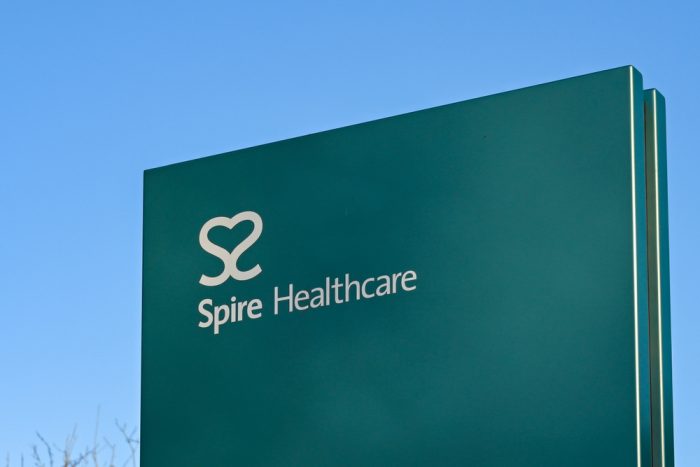Spire Healthcare has seen revenue from private medical insurance (PMI) climb sharply as case numbers and fees have risen in 2024, while self-pay income has dropped.
Its half year results to 30 June results revealed PMI revenue grew 9.7% to £336.4m contributing to a rise in profit after tax of £14.1m from £12.7m in the same period of the previous year.
The hospital group noted volumes of PMI patients, including admissions and outpatient procedures, were up 5.8% while PMI average revenue per case (ARPC) was up 4.2% to £2,992, compared to the first six months of 2023.
It added this year-on-year growth was encouraging and reflected an increase in referrals and the reported ongoing growth of the medical insurance market, with more corporate and private policies, a trend that has continued into H2 2024.
The increased volume seen in H1 2024 included a slightly higher proportion of daycase than inpatient treatments.
Spire’s contracts with PMI providers generally allow for price adjustments in Q1 and Q2 and contain mechanisms linked to inflation, as well as pricing incentives to capture increased patient flow from insurance partners, it said.
However, self-pay revenue fell 3% year-on-year which the group said was driven by competitiveness and some patients of working age switching from self-pay to private medical insurance. Self pay ARPC increased 7.5% to £4,618.
Meanwhile, NHS revenue grew 5.2% to £179.3m in the first six months of this year compared to last year, with increasing referrals through the group’s electronic referral system.
Overall NHS volumes, including admissions and outpatient procedures, were up 1.3% year-on-year and NHS ARPC up 6.4% to £3,509 in H1. The NHS tariff for 2024-25 was released and went live on 1 April, resulting in a net 0.6% uplift to prices, Spire said.
Patients switching to PMI
Justin Ash, chief executive officer of Spire Healthcare, said: “These are strong results that demonstrate our strategy as an expanded group is delivering.
“Our private revenue grew in H1, driven by strong growth in private medical insurance which has seen a resurgence among working-age people. Patients are also increasingly switching between self-pay and PMI.
“Our work with the NHS also increased in the first half, partly due to higher commissioning, increased complexity and patients exercising the right to choose where they receive treatment. Spire stands ready to work with the new government to help address NHS waiting lists.
“Our investment in mental health and physiotherapy has also seen good growth, and we are confident this will continue. Vita plays a vital role in helping people live healthier lives and get back to work.
“I am also pleased to report that our savings programme remains on track and we are maintaining our safe and high quality care. We look forward to building on the group’s performance in the first half and we are entering the second half confident of further progress.”
Clinic sale and openings
The first six months of 2024 also saw Spire complete the sale of its Tunbridge Wells hospital to the Maidstone and Tunbridge Wells NHS Trust at the end of March 2024 for £9.975m.
Since the sale, Spire said it has continued to run the hospital operations on behalf of the trust and during the period, it reached an agreement with the NHS to support the Sussex health system, helping to reduce its list of long waiter NHS patients by providing treatment through a group of Spire hospitals in the south of England.
The group previously revealed plans to target 10 new medical clinics to meet the growing healthcare needs in UK communities.
It opened the first clinic at Abergele, North Wales earlier this year and said performance is on track, adding that work to open a second clinic at Harrogate is well underway and it aims to open the doors to patients later this year.
